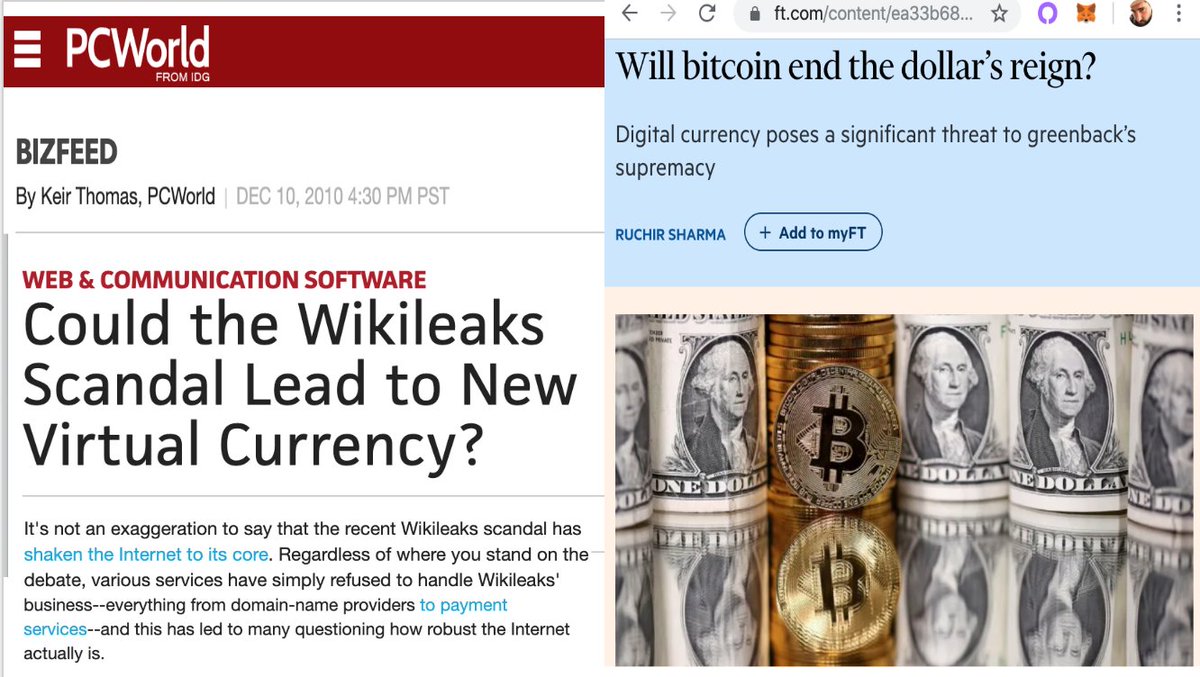Virtual currency. (2010)  Threat to the dollar. (2020)
Threat to the dollar. (2020)
A how-it-started salute thread to the first #Bitcoin news article on its 10th anniversary.
news article on its 10th anniversary.










 Threat to the dollar. (2020)
Threat to the dollar. (2020)A how-it-started salute thread to the first #Bitcoin
 news article on its 10th anniversary.
news article on its 10th anniversary.









2/ The first MSM article on #Bitcoin  appeared in @pcworld on December 10, 2010.
appeared in @pcworld on December 10, 2010.
A few articles before it referenced BTC (in brief or in passing), but this article had a new narrative: Bitcoin for censorship-resistant payments.
 appeared in @pcworld on December 10, 2010.
appeared in @pcworld on December 10, 2010. A few articles before it referenced BTC (in brief or in passing), but this article had a new narrative: Bitcoin for censorship-resistant payments.
3/ @wikileaks had been de-platformed by PayPal and the author was out to explore how #Bitcoin  , an upstart digital money might come to its aid.
, an upstart digital money might come to its aid.
How about an entire currency based on peer-to-peer technology?
 , an upstart digital money might come to its aid.
, an upstart digital money might come to its aid.How about an entire currency based on peer-to-peer technology?
4/ The idea was weeks old – first suggested by @nardoism in November – but it proved polarizing.
@orionwl thought Wikileaks accepting #Bitcoin would be a “great moment.” @jgarzik argued it might encourage governments to attack the network.
would be a “great moment.” @jgarzik argued it might encourage governments to attack the network.
https://bitcointalk.org/index.php?topic=1735.80
@orionwl thought Wikileaks accepting #Bitcoin
 would be a “great moment.” @jgarzik argued it might encourage governments to attack the network.
would be a “great moment.” @jgarzik argued it might encourage governments to attack the network.https://bitcointalk.org/index.php?topic=1735.80
5/ But if Bitcoiners were split on the idea. The author made it clear he thought #Bitcoin  might be ready for primetime.
might be ready for primetime.
After all, he argued #BTC was then increasingly being used in trade.
was then increasingly being used in trade.
 might be ready for primetime.
might be ready for primetime.After all, he argued #BTC
 was then increasingly being used in trade.
was then increasingly being used in trade.
6/ More people, he noted, were running the client and mining #Bitcoin  for a chance to earn rewards.
for a chance to earn rewards.
At that time, someone running the software could expect to receive 50 BTC every 3 weeks.
 for a chance to earn rewards.
for a chance to earn rewards.At that time, someone running the software could expect to receive 50 BTC every 3 weeks.
7/ Back then, the article shows the idea that #Bitcoin  was a “store of value” or that it had “intrinsic value” (as an alternative to state money) hadn’t yet been embraced.
was a “store of value” or that it had “intrinsic value” (as an alternative to state money) hadn’t yet been embraced.
The accepted thesis was bitcoins had value as it was payment “for services and goods.”
 was a “store of value” or that it had “intrinsic value” (as an alternative to state money) hadn’t yet been embraced.
was a “store of value” or that it had “intrinsic value” (as an alternative to state money) hadn’t yet been embraced. The accepted thesis was bitcoins had value as it was payment “for services and goods.”
8) Other #Bitcoin  descriptions are more familiar. You can tell the author was enamored with the idea Bitcoin could be an unstoppable software for value exchange.
descriptions are more familiar. You can tell the author was enamored with the idea Bitcoin could be an unstoppable software for value exchange.
Given the internet censorship, this censorship-resistance made Bitcoin a powerful tool.
 descriptions are more familiar. You can tell the author was enamored with the idea Bitcoin could be an unstoppable software for value exchange.
descriptions are more familiar. You can tell the author was enamored with the idea Bitcoin could be an unstoppable software for value exchange. Given the internet censorship, this censorship-resistance made Bitcoin a powerful tool.
9) Was the author fully convinced of #Bitcoin  ’s success?
’s success?
No, but he speculated it could be a tool to inhibit government overreach on the internet.
 ’s success?
’s success? No, but he speculated it could be a tool to inhibit government overreach on the internet.
10) Despite the positive review, one Bitcoiner wasn’t a fan. That would be Satoshi Nakamoto, who thought the attention could be catastrophic.
He left the BitcoinTalk forum, never to return, the next day.
https://bitcointalk.org/index.php?topic=1735.140
He left the BitcoinTalk forum, never to return, the next day.
https://bitcointalk.org/index.php?topic=1735.140
11) But since #Bitcoin  is decentralized, the idea stuck. @wikileaks began accepting Bitcoin in June the next year. https://www.forbes.com/sites/andygreenberg/2011/06/14/wikileaks-asks-for-anonymous-bitcoin-donations/
is decentralized, the idea stuck. @wikileaks began accepting Bitcoin in June the next year. https://www.forbes.com/sites/andygreenberg/2011/06/14/wikileaks-asks-for-anonymous-bitcoin-donations/
 is decentralized, the idea stuck. @wikileaks began accepting Bitcoin in June the next year. https://www.forbes.com/sites/andygreenberg/2011/06/14/wikileaks-asks-for-anonymous-bitcoin-donations/
is decentralized, the idea stuck. @wikileaks began accepting Bitcoin in June the next year. https://www.forbes.com/sites/andygreenberg/2011/06/14/wikileaks-asks-for-anonymous-bitcoin-donations/
12) How far have we come?
The @Pcworld article, written by @KeirThomsBryant, can be read in full below. https://www.pcworld.com/article/213230/could_wikileaks_scandal_lead_to_new_virtual_currency.html
The @Pcworld article, written by @KeirThomsBryant, can be read in full below. https://www.pcworld.com/article/213230/could_wikileaks_scandal_lead_to_new_virtual_currency.html

 Read on Twitter
Read on Twitter











